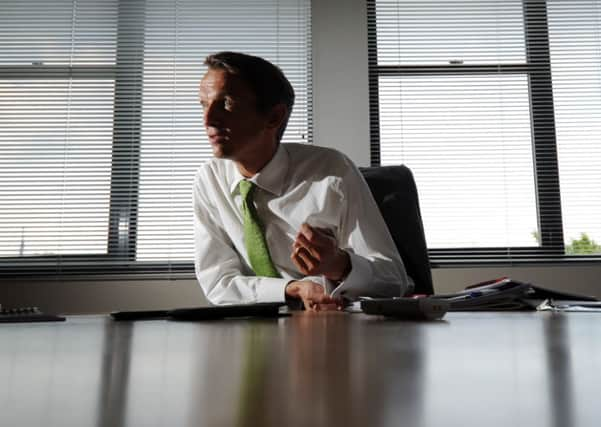Bank of England may keep rates low for longer, says chief economist Haldane


Andrew Haldane, who is from Yorkshire, said he was more downbeat about the outlook for the economy, given weaker global growth, greater financial and political risks and the danger that wages and productivity in Britain might continue to fail to recover as forecast.
“Put in rather plainer English, I am gloomier,” Mr Haldane said in a speech to businesses at the Kenilworth Chamber of Trade. “This implies interest rates could remain lower for longer, certainly than I had expected three months ago.”
Advertisement
Hide AdAdvertisement
Hide AdMr Haldane, who took over as chief economist at the BoE in June, gave an unusually specific steer to financial markets on when the BoE might start to raise interest rates.
In an interview with ITV television, he said market expectations that rates might rise “somewhere in the middle of next year” were possibly “not a bad bet” although the economic outlook could change a lot before then.
Sterling fell by around half a cent against the dollar after Mr Haldane’s speech was released. It also dipped against the euro.
UK base rates have sat at a record low of 0.5 per cent since the depths of the financial crisis more than five-and-a-half years ago.
Advertisement
Hide AdAdvertisement
Hide AdMarket expectations of when they will finally rise have swung sharply in the past few days after the biggest global sell-off of shares in two years due to fears of slower growth and rising political risk.
Marc Ostwald, a fixed income strategist at ADM Investor Services International, said markets were currently betting on a rate rise around September, though earlier this week some measures had implied no increase in rates at all next year.
By contrast, just a couple of weeks ago markets expected a rate rise in early 2015.
So far, two of the BoE’s nine policymakers have voted to start raising in interest rates.
Advertisement
Hide AdAdvertisement
Hide Ad“Haldane’s comments have added to the changing market expectations of a rate hike,” said Alvin Tan, currency strategist at Societe Generale.
Mr Haldane’s language marked a sharp change of tone since his last major speech in June, when - in a cricketing analogy - he said he favoured being on the front foot rather than the back foot when it came to raising rates.
Britain’s economy was now “writhing in both agony and ecstasy”, Mr Haldane said. Growth was set to be the fastest among major nations this year and inflation and borrowing costs were low. But real wages and productivity had endured their weakest run since the 19th century, apart from the aftermath of World War Two.
BoE Governor Mark Carney said earlier this week the central bank would need to take into account signs of a slowdown in the euro zone when setting rates, and Mr Haldane said that there was a risk Britain’s strong growth could prove temporary.
Advertisement
Hide AdAdvertisement
Hide Ad“What will be interesting is whether this represents the view of the majority of the committee,” said ADM’s Ostwald.
Although it was possible that wages and productivity would start to pick up as the recovery continued, past BoE forecasts of this had proven wrong and financial markets were increasingly pricing in the danger that growth would falter, Mr Haldane said.
Rather than developing into a normal expansion, Britain could be at risk of “secular stagnation”, meaning a very long period of negligible growth.
“If there is genuine uncertainty about the path of the economy, the optimal policy response may be to avoid the worst outcomes,” Mr Haldane said.
Advertisement
Hide AdAdvertisement
Hide AdThe picture was complicated further by wide divergences in wage trends. The number of middle-income jobs had fallen since the financial crisis, and while there were more low-wage jobs than before - keeping unemployment down - real wages from these were no higher than in 1997.
Higher immigration, tougher benefit rules and growing numbers of older people working had all probably put downward pressure on wages for the low-paid, Mr Haldane said.
This contributed to low inflation pressures.
Inflation fell to a five-year low of 1.2 per cent in September and wages are rising by even less.
Mr Haldane grew up in Leeds and attended comprehensive school in Guiseley.